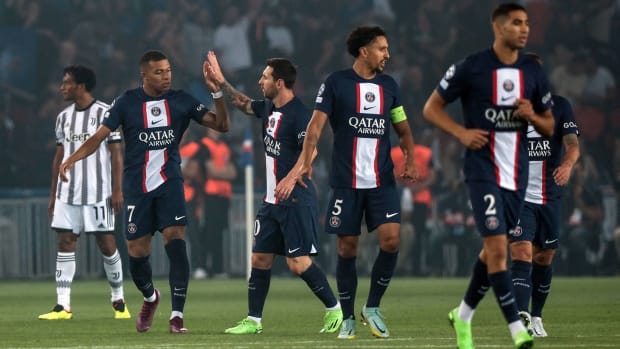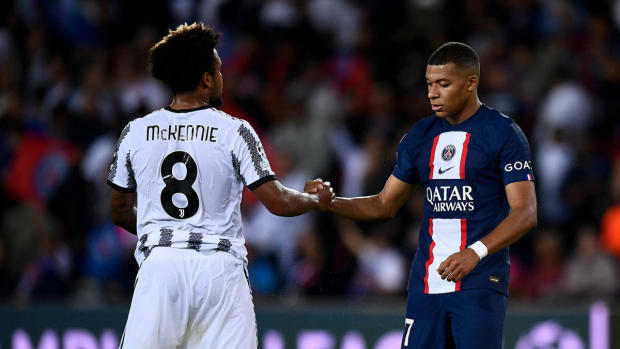It was quintessential Paris Saint-Germain, only more so. For the first quarter of PSG’s Champions League group opener vs. Juventus, it was sensational, scoring two brilliant goals. Then it became self-indulgent, and by the end, while it was never exactly hanging on, it was definitely anxious. A 2–1 win over Juventus represents a useful start to its Champions League campaign, its first under Christophe Galtier, but it was nervier than it needed to be and, worse, that wobble suggested that the propensity to collapse under pressure that has dogged PSG in the Champions League has not gone away.
PSG has been in tremendous form so far this season in France, winning five and drawing one of its six games so far, and racking up 24 goals in the process. Some of the interactions between the front three of Kylian Mbappé, Neymar and Lionel Messi have been mesmerizing, the sort of football PSG’s Qatari owners must have dreamed of when they bought the club in 2011. But it’s one thing to dazzle in France, quite another to do so in the Champions League.

Federico Tardito/Insidefoto/Imago Images
The early signs, though, were very good. There will be much tougher tests than this faded Juventus, but those first 22 minutes should be enough to concern the rest of Europe. The interplay, the changes of pace, the ability to find new angles suggested total control. By the mid-point of the first half it seemed Juventus had been reduced to damage limitation.
But having taken a 2–0 lead within those 22 minutes, PSG was not then as ruthless as it might have been. There was, perhaps, a tendency to over-elaborate, a search for a goal of memorable flamboyance. Too many players tried to do too much themselves. But then the first two goals were so extraordinary, the result of brilliant players operating brilliantly together, that it perhaps encouraged extravagance.
The two goals shared a similar tempo: a slow, rhythmical buildup followed by a sudden injection of pace. For the first, scored after five minutes, Mbappé pushed the ball to Neymar and then accelerated into the box, smashing in a volley as the Brazilian scooped the ball over the Juventus defense. Mbappé also got the second, laying Achraf Hakimi’s pass off first time for Marco Verratti and then running on to slam in the first-time cross.
Everywhere in the forward line there were positive signs. Neymar and Mbappé linked up repeatedly, while Messi, after a largely disappointing first season, is forging a dangerous partnership on the right with Hakimi. But scoring goals was never really the problem for PSG. The issue rather was a forward line that is reluctant to track, which means there must always be compromise and probably vulnerability.
And that has not gone away. The flip side of PSG’s excellence was how generally poor Juventus was. Three years ago the club took an enormous gamble to try to bring Champions League success, easing Max Allegri from his post after five straight scudetti and then blowing the budget on Cristiano Ronaldo. It is still paying the price for those decisions. The purchase of Ronaldo disrupted the setup (and how could he ever have worked with Allegri’s successor, the dour and hard-pressing Maurizio Sarri?) and meant resources to improve the rest of the squad were restricted.
Allegri returned last year to oversee the rebuilding project, but the sense that lay behind his last departure, that his football is no longer in the vanguard of modern tactical thinking, has only grown. Fourth last season, Juventus has started this season poorly, winning only two of its first five league games and looking extremely dependent for goals on Dušan Vlahović.

Nicolo Campo/Imago Images
But whatever the doubts about Allegri’s philosophy, he remains an extremely astute tactician. He changed shape at halftime, abandoning the back three of the first half for a back four. The result was that, rather than the wingbacks being driven deep, the wide midfielders, Juan Cuadrado and Filip Kostić, became far more involved from an attacking point of view. It was a Kostić cross following a short corner that led to Weston McKennie heading Juventus back into the game eight minutes into the second half.
As it was, Juventus never had quite the quality to really apply the sort of pressure that, say, Real Madrid did in the last 16 last season. PSG was able to hold the ball for long periods and run down the clock. This was, ultimately, a relatively comfortable win. And yet it could have been a lot more comfortable. And the fact it wasn’t suggests exactly why PSG has so often disappointed in Europe and why doubts remain about its ability to cross that final barrier.
“There’s a slight difference between the first 35 minutes and the second half. We know we have a few shortcomings,” Mbappé told RMC Sport after the match. “It’s not missing goals that penalizes your team, it’s thinking about those misses that does. We have things to work on, it’s normal, this is the Champions League. If it was easy we’d have already won it.”







